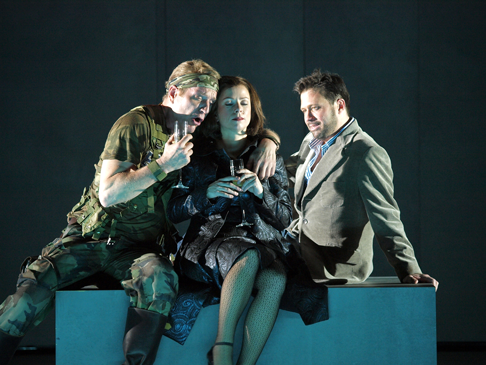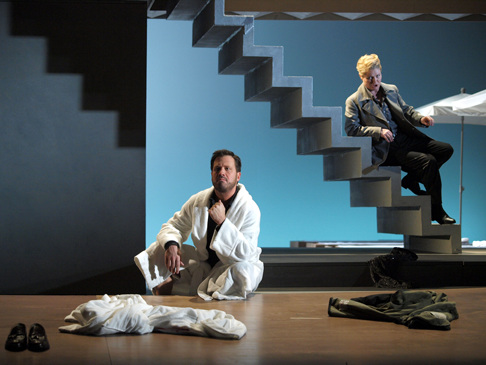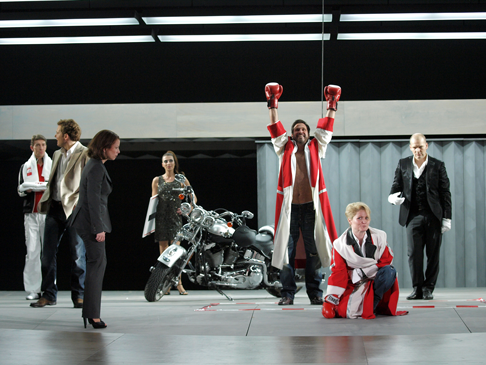24 Feb 2009
No Home for Heroes at the Theater an der Wien, Vienna — Pierre Audi’s new production of Handel’s Partenope.
Handel operas are like London buses — you wait for ages and then 3 come along together.

Handel operas are like London buses — you wait for ages and then 3 come along together.
In the past few years we’ve seen several new productions of this very atypical Handel opera seria and all, except this one, have emphasised the comic elements rather than the tragic. Perhaps it’s because the story of Queen Partenope and her warring lovers is on the slight side, and there is no obvious heroic choice or battle to confront — just the question of who should end up in whose bed. So far, so soap opera.
But even soap operas need more than romantic liaisons, and Handel knew that — especially as at the time he wrote Partenope (five years before the better-known Alcina) he was struggling to re-establish his status with some lesser-known singers. He introduced many new musical and dramatic ideas to woo back his public, but he also had to work with some artists of more limited accomplishment than he was used to. It is a tribute to his artistry that the first fact effectively disguises the second.
The story is the usual mix of romantic betrayal, cross-dressed disguise, and misunderstandings. Pierre Audi imagines Partenope (Christine Schäfer, edgy, brittle, petite) as a wealthy socialite, ensconced in her American West Coast beach-side villa, surrounded with her lovers and their friends, served by a slightly mysterious butler, Ormonte (Florian Boesch, smoothly camp) and assorted hangers-on. They live an empty, artificial existence fuelled by sex, drugs and champagne (and the services of their personal trainer) to stave off the most dreaded threat of all: boredom.
But suddenly everything changes when her current favourite, Arsace, (David Daniels, tanned, trim and buffed) becomes aware that the latest guest to the party is his ex-fiancée Rosmira, (Patricia Bardon, as ever perfectly ambiguous) disguised as a man, Eurimene. Rosmira is out for revenge, of the most subtle and cruel kind, and from that moment on it is around Arsace that the whole opera revolves, as he is sucked in, smashed, and spat out again from this emotional vortex. There are two sub-plots involving another high-roller, Armindo, (Matthias Rexroth, handsome, stolid) and a slightly shady outsider, Emilio, (Kurt Streit, macho bike gear to the fore) who both covet Partenope’s favour, but it is the Arsace-Rosmira-Partenope triangle that is the powerhouse of this production.
 Kurt Streit (Emilio), Christine Schäfer (Partenope) and David Daniels (Arsace)
Kurt Streit (Emilio), Christine Schäfer (Partenope) and David Daniels (Arsace)
The whole opera is set in Partenope’s villa and between them Audi and set designer Patrick Kinmonth have created a most effective and intriguing space. Huge blocks of grey wall swivel on both the horizontal and vertical axis, rotating and metamorphosing into new rooms and passages. We glimpse pools and lawns upstage, and second floors are reached by ingenious stairways that mutate into windows. Lighting by Matthew Richardson is equally effective and mood-enhancing. The only off-note is a strangely-sloping apron above the orchestra pit — which on occasion has the effect of cutting off the singers’ feet from the parterre audience’s view and causing some obvious physical difficulty to Schäfer in particular, who wears dangerously high heels for most of the opera. Perhaps that explained her continual expression of worried vulnerability. There was no such physical difficulty for the rest of the cast: their costumes were very much modern “chic tat” - much leather, torn designer denim and expensive trainers — and there was evidence of long, detailed rehearsal in the slickness of their moves and interactions. The mock battle scene became a parody of itself — an ironic nod to the recent “combat fatigues and machine guns” genre of baroque opera stagings — with the characters enjoying a paintball style warfare game that only briefly suggested real danger. It’s musical impact was however real enough with some powerful work from the brass and winds.
In the pit, Christophe Rousset (at the harpsichord) led his experienced band Les Talens Lyriques with sure-footed verve and impeccable style throughout. This was not surprising, given their reputation, but a pleasant relief given some period bands’ apparent difficulty with intonation from time to time, especially with the dreaded natural horns. No such problems at first night — despite the wintry conditions outside and the oven-heat within. Tempos were non-controversial, line and attack sans pareil.
 David Daniels (Arsace) and Patricia Bardon (Rosmira)
David Daniels (Arsace) and Patricia Bardon (Rosmira)
Vocally, this first performance was patchy, and it was soon obvious who had got it right and who might need a re-think. In the title role Christine Schäfer sang correctly but without particular passion or gaiety, a strangely constrained performance that didn’t convey the sheer magnetism of Partenope the man-eater. The role has few slow, thoughtful arias, (Care mura is only an arioso) and her music can sound rather similar, so it is essential that the singer makes the most of this element of the character, despite any directorial view pushing it elsewhere. Having said that her Qual farfalletta and Io ti levo were convincingly sung.
In contrast, Handel wrote for the anti-hero Arsace some of the best and varied music of the opera. David Daniels was constantly impressive in his finely judged expressive singing, his innate baroque style, and his total immersion in one of this opera’s few characters that actually go through any significant emotional journey. Some of his colleagues could usefully study his use of the eyes to hold an audience. His coloratura work in the rage/despair aria at the end of the second Act, Furibondo spira il vento was scintillating; his eloquent and delicately original ornamentation in the melting Ch’io parto in the third a reminder of why he is the world’s first choice in these roles. Equally proficient and emotionally-charged was Patricia Bardon’s Rosmira/Eurimene — here is another singer who, like Daniels, understands the genre, and has the technical brilliance and dramatic skills to convince in any director’s visual world. Her character’s wounded pride and twisted love were impeccably portrayed. Io seguo sol fiero worked particularly well with the oboes and horns of Rousset’s orchestra. Her male impersonation throughout was well-judged to suit the requirements of the story.
Almost but not quite matching these two was Kurt Streit, more at home in Mozart than Handel, but well-versed in this particular role. His ringing tenor and athletic poise was as upfront as his biker-gear and he obviously enjoyed his brief forays upstage on the Harley-Davidson that lurked menacingly, it’s gleaming chromework a latent threat throughout. In contrast to the polite purr of the machine however, it occurred that someone might suggest that he moderates his decibel level — the cosier confines of the Theater an der Wien don’t need tenors to bounce off the walls.
 David Daniels (Arsace), Patricia Bardon (Rosmira) and cast
David Daniels (Arsace), Patricia Bardon (Rosmira) and cast
In this production the other alto role of Armindo was taken by the young German countertenor Matthias Rexroth. Some of his music was cut and he therefore had less opportunity to make a strong vocal or dramatic impression. What we saw and heard was adequate, but tending to the wooden at times. In this version his character does not win the lady (at least we are left presuming so) and we are not surprised. The butler Ormonte was characterfully sung and acted by baritone Florian Boesch, who made the most of the ever-present “ring-master” role and who, in the end, actually referees the denouement of the whole opera — the “fight” between Arsace and Rosmira-as-Eurimene.
It is this finale which cleverly encapsulates Audi’s vision of Partenope’s latently violent world: the confrontation becomes an actual boxing match set inside the villa, complete with ropes, hanging microphone, glitzy scorecard girls and the protagonists in lurid red and white towelling robes. The watching characters seem to hold their breath as Arsace makes the winning blow: his opponent must fight, like him, bare-chested (and thus betray her sex). This cruel twist breaks her spirit, and reveals all the treachery and immorality lying beneath the sham glamour of their lives. Handel’s final chorus is oddly abrupt and Audi leaves us wondering whether any of them will ever love each other again. No heroes here in Vienna, just a baroque opera for the 21st century, and none the worse for it.
Sue Loder © 2009
Handel’s Partenope at the Theater an der Wien, Vienna, Austria. Remaining performances on 25th, 27th Feb. (T.Wey as Arsace on 27th only), and 1st, 4th and 6th March.